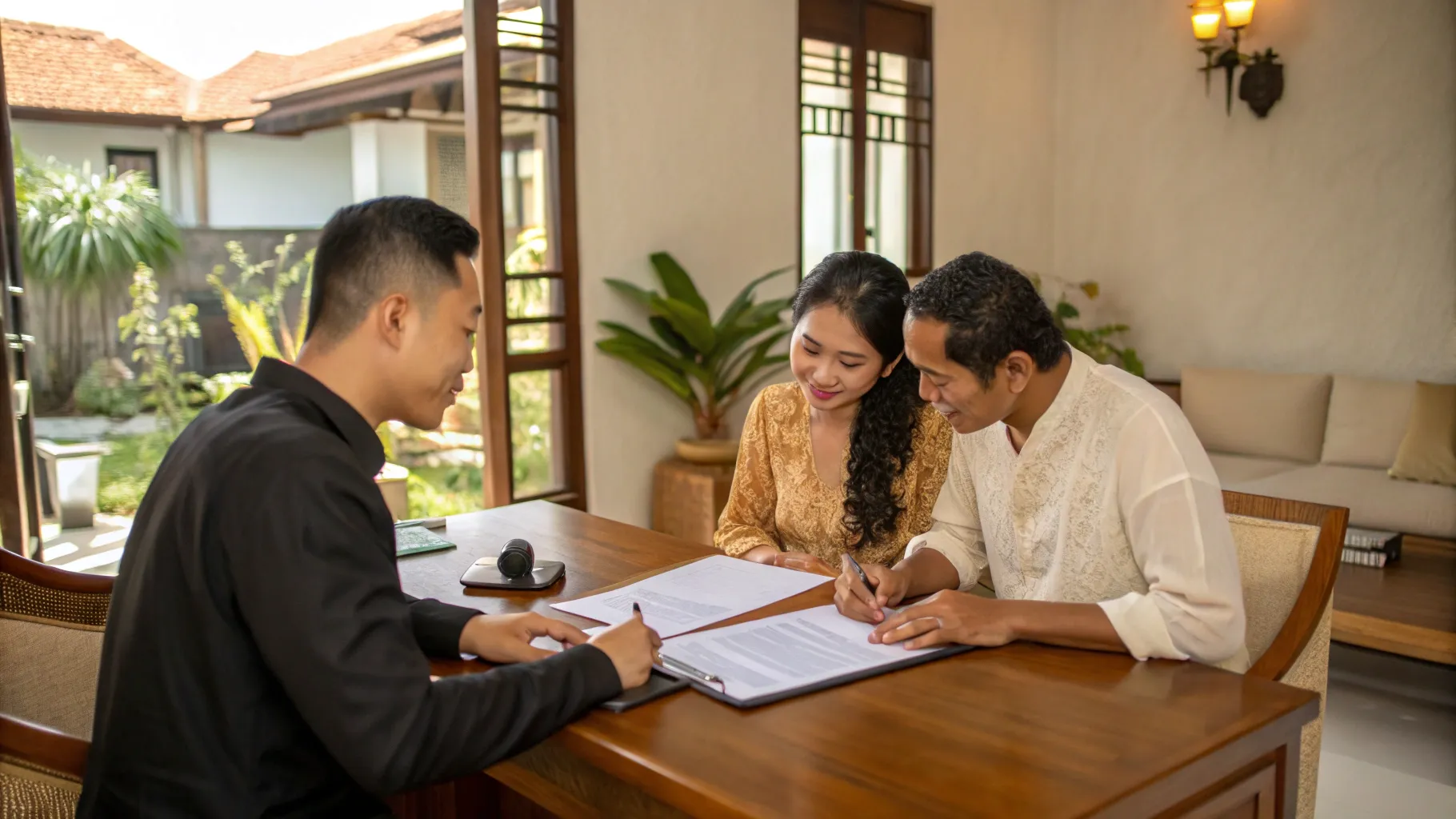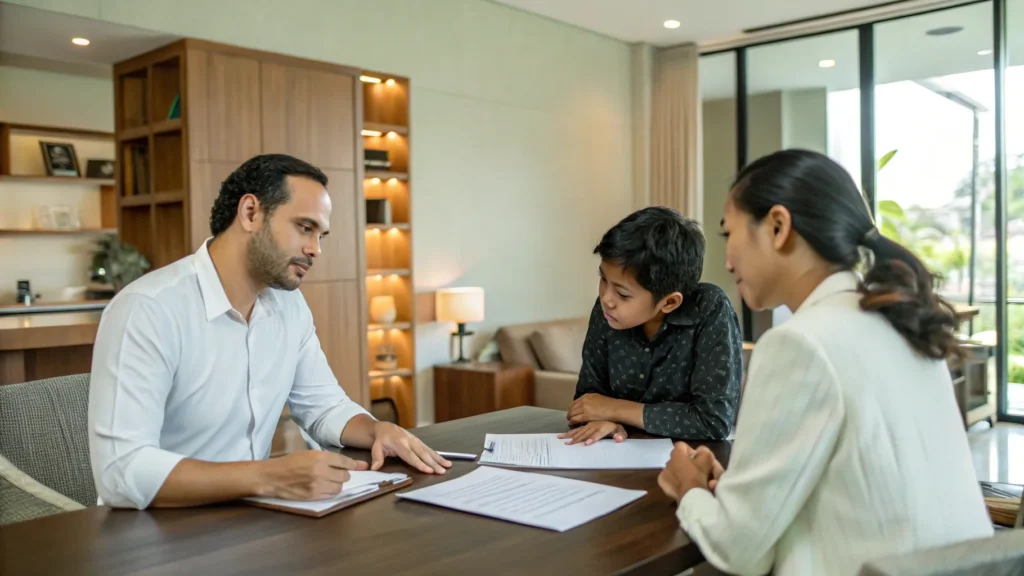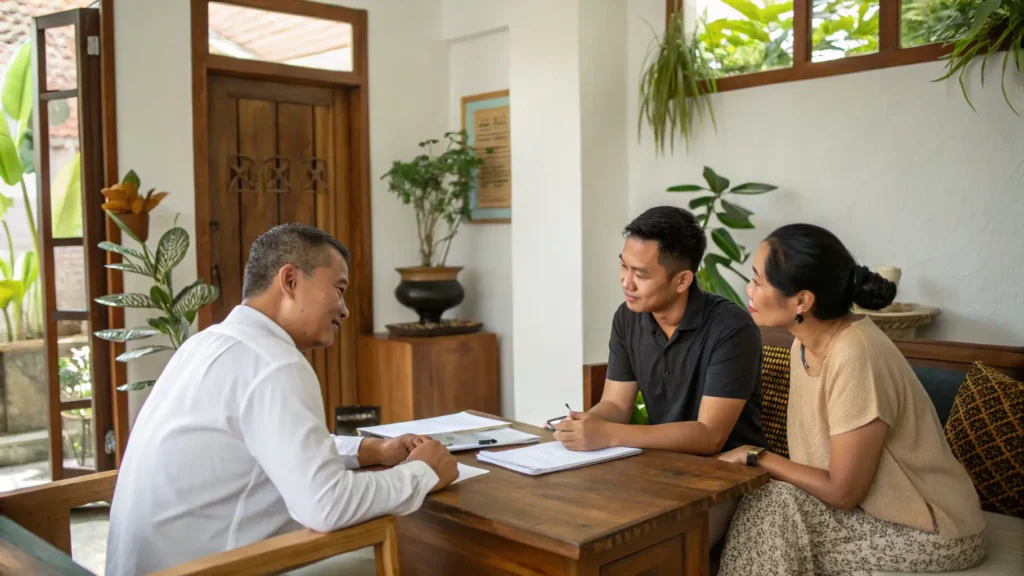Divorce in Indonesia: A Legal Guide for Indonesian Citizens Married to Foreigners
oktarina
September 15, 2025
12 min read

Divorce in Indonesia can be a complicated process, especially when it involves couples with different nationalities. When an Indonesian citizen (WNI) marries a foreign national (WNA), the legal procedures become more complex, ranging from jurisdictional issues to child custody and asset division. Given the growing number of international marriages, it’s crucial to understand how divorce works in Indonesia so you know what steps to take and how to go through the process correctly. Divorce in Indonesia is only considered valid if it is processed and finalized in court. Only divorces that are processed through the proper legal channels are legally recognized in Indonesia.
If you or someone you know is facing this issue, this article provides a complete guide on what to consider when going through a divorce between an Indonesian citizen and a foreign national. From legal procedures to practical matters that many people may not be aware of, keep reading to get clear and useful information on how to approach a divorce in Indonesia. Understanding the requirements to divorce in Indonesia legally is crucial, especially if one spouse is from a foreign country.
Legal Basis for Divorce in Indonesia
In Indonesia, divorce is governed by several different laws, depending on the couple’s religion. For non-Muslim Indonesians, divorce follows Law Number 1 of 1974 on Marriage, which is the primary legal framework for marriage and divorce, and is further regulated by government regulation. For Muslim couples, the applicable law is the Compilation of Islamic Law (KHI), which regulates divorce under Islamic principles. Muslim marriages are registered through the Office of Religious Affairs (KUA), while non Muslims register their marriages at the civil registry. Islamic divorces must be conducted in a religious court, while non-Muslim divorces are processed in civil courts. Divorce can only be finalized during a court session in the appropriate court.
However, when one partner is a foreign national, there are additional factors to consider. One key issue is the difference in legal systems between Indonesia and the foreign national’s home country, which could affect how the divorce is processed. It’s important to understand where the divorce should be filed—whether in Indonesia or in the foreign partner’s home country. The divorce process may differ for non muslims and muslim marriages, depending on whether the marriage was registered at the civil registry or the religious affairs office. The divorce process can be more complex due to the differences in laws and procedures in each country. Therefore, if you’re in this situation, it’s important to understand when and where to start the divorce process to ensure everything proceeds according to the applicable laws.
Read more: Visa Concierge Service Bali: A Practical Solution for a Stress-Free Vacation
Divorce Petition Process for Indonesian Citizens Married to Foreigners

Divorce can be emotionally challenging and complex, especially when one partner is from a different country. For Indonesian citizens married to foreign nationals, the divorce process is more complicated because it involves differences in legal systems, language, and even culture. In Indonesia, there are several steps to follow to ensure that the divorce proceeds according to the law, whether the couple is Muslim or non-Muslim. Here’s what you need to know to navigate a divorce with a foreign partner.
1. Filing for Divorce in Court
The first step in the divorce process is filing a divorce case in court. For Muslim couples, the divorce must be filed with the Religious Court, while non-Muslim couples must file a divorce petition with the District Court. It’s essential to know which court to approach, as this can differ depending on the couple’s religious background. The divorce process in Indonesia requires filing in court and does not recognize divorce by mutual consent. The first court hearing of a divorce petition can take two weeks after registration if the parties are domiciled in Indonesia. The divorce can only be finalized during a court session, and the court’s decision is legally binding.
The documents typically required for this process include the marriage certificate, ID cards of both partners, and the birth certificate of any children, if applicable. For divorce cases involving children, you will also need to provide the child’s birth certificate and family card. However, if your spouse is a foreign national, be sure that all necessary documents, such as the marriage certificate and ID card, are translated into Indonesian and legalized in accordance with the law. Document legalization and translation must be done carefully, as any mistakes can delay the divorce process. Indonesian courts require all marriages to be registered for legal divorce proceedings to occur.
2. Mediation and Divorce Hearing
Before proceeding to a hearing, the court will encourage mediation to help the two parties find a resolution without going through a full divorce process. Mediation aims to ease tensions and find a middle ground that both parties can agree on. Mediation is required for couples undergoing divorce in Indonesia aiming to encourage reconciliation. If mediation fails or an agreement isn’t reached, the divorce hearing will proceed.
At the hearing, both parties will be asked to present evidence and witnesses. If one party cannot attend, they may be represented by a lawyer, and the other party will be notified accordingly. For couples involving a foreign national, this process can become more complicated, as it may require the assistance of a legal translator or even an international lawyer to ensure that the divorce proceeds according to the applicable laws in both Indonesia and the foreign national’s home country. Judgments regarding divorce and child custody in Indonesia can be appealed within 14 days after the court’s decision. If no appeal is filed, the court decision becomes final.
For Islamic divorce, there is a mandatory waiting period (‘iddah’) during which the ex-wife cannot remarry after the court’s decision. Divorce cases involving foreign nationals can be more challenging, but with proper preparation, such as gathering complete and valid documents, a married couple can ensure the divorce case proceeds smoothly.
Things to Consider for Indonesians Married to Foreigners in Divorce in Indonesia
Divorce between an Indonesian citizen and a foreign national requires special attention because it involves differences in laws, cultures, and procedures. Here are a few critical things to keep in mind when going through a divorce in Indonesia.
- Document and Legal Requirements
The divorce process requires complete legal documents, including the marriage certificate, ID card, or passport. If your partner is a foreign national, documents like the marriage certificate issued abroad must be translated and legalized according to Indonesian law. Ensure that the documents are valid to avoid delays in the divorce process. - Child Custody in Divorce
If there are children involved, child custody becomes a key issue. In Indonesia, the court will prioritize the best interest of the child in determining who will have custody. If one parent is a foreign national, international factors, such as where the child will live after the divorce, will also be considered. This process may involve more complex international legal considerations. Custody decisions in Indonesia are based on the child’s best interests, and mothers generally receive custody of children under 12 years old. The father is typically responsible for all maintenance and education costs for the child after divorce unless the court assigns this obligation to the mother. Both the mother and the father have legal obligations for the child’s care and support. - Division of Joint Assets
The division of joint assets, also known as marital assets, is also a crucial issue, especially if there are assets located abroad. In Indonesia, assets acquired during the marriage will be divided based on Indonesian law. However, for assets located outside of Indonesia, dividing them might require additional international legal procedures. It’s essential to understand the legal process in the country where those assets are located. Assets acquired during the marriage become joint assets.
Issues Faced by Indonesian Citizens Married to Foreigners in Divorce

Divorce between an Indonesian citizen and a foreign national often involves more complex challenges than a standard divorce. In addition to emotional difficulties, there are practical hurdles, such as language barriers, international jurisdiction, and time and cost issues. Here are some of the primary issues you should know. The leading causes of divorce in Indonesia include constant arguing, financial issues, and domestic violence, with over 250,000 marital conflicts reported in 2024.
- Language and Communication Barriers
A major obstacle is the language barrier. Divorce often requires the translation of legal documents and communication in court. Without the assistance of a legal translator who understands both Indonesian and international legal terms, the process can become longer and more confusing. Miscommunication can often add to the tension between the couple, making the process even more difficult. - International Jurisdiction
International divorce often involves dual jurisdiction, where two or more countries claim the right to decide the divorce. This can create major issues because Indonesian law may conflict with the laws of the foreign national’s home country. This conflict can make the divorce process longer as a decision needs to be made about which country’s court will have jurisdiction over the divorce. - Time and Cost-Intensive Process
Divorce involving a foreign national tends to take longer and cost more. In addition to handling documents from abroad, this type of divorce often requires translations, international court filings, and additional costs. This can place a financial burden on the parties involved, both in terms of time and money.
Legal Protection for Indonesians in International Divorce
As an Indonesian citizen, you are entitled to legal protection that is the same as other Indonesian citizens. The Indonesian court will make sure your rights are upheld, whether it’s in the division of assets or child custody. If an international dispute arises, you can seek assistance from the Indonesian government to ensure your rights are respected and upheld internationally. While international divorce can be more complicated, rest assured that Indonesian law still applies.
- Right to Asset Division and Asset Distribution
Assets acquired during the marriage must be divided fairly. For assets located in Indonesia, the division will be carried out according to Indonesian law. However, for assets located abroad, dividing them may be more complicated because it involves the law of the country where those assets are located. In such cases, you may need international legal help to ensure fair division. However, the principle of fairness will still apply. - Protection for Children in Divorce of Indonesian Citizens and Foreign Nationals
If you and your partner have children, the best interest of the child will always be the primary consideration. The Indonesian court will prioritize the child’s welfare when deciding custody and visitation rights. If one parent is a foreign national, the court will also consider international factors, such as where the child will live after the divorce. The decision will always focus on what’s best for the child, even when international law is involved.
With these legal protections, you don’t have to worry about your rights being overlooked in a divorce with a foreign national. Indonesian law ensures that the divorce process is fair and that your rights are upheld.
Alternative Dispute Resolution for Indonesian Citizens Married to Foreigners

Divorce between an Indonesian citizen and a foreign national can be challenging, but there are several alternative dispute resolution options you can choose to avoid a lengthy and costly court process. Here are some options you can consider to resolve your divorce more efficiently.
- Mediation and Out-of-Court Settlement
In addition to court proceedings, international divorce can also be resolved through mediation. This is often a quicker and more cost-effective alternative than going through the courts. Mediation involves a neutral third party helping you and your partner find a mutually agreed-upon solution. Mediation can cover issues such as asset division, child custody, and other matters, providing an opportunity to reach an agreement without going through a lengthy legal process. - Hiring a Family Lawyer
To simplify the divorce process, it’s highly recommended to using a legal services in Bali, with experience in international law. If you’re in Bali, you can choose a lawyer who specializes in handling international divorces. Bali Premium Trip, family law services can also assist you in managing various aspects of the divorce process, from filing documents to understanding international law. A good lawyer will guide you through the complex legal procedures and ensure your rights are protected. - Arbitration for Divorce Dispute Resolution
Another alternative for resolving divorce disputes is arbitration. In arbitration, a qualified third party will decide on the issues at hand. The advantage of arbitration is that it’s a quicker process than court proceedings because decisions are made within a relatively short time and are final. Arbitration can be a good choice if you and your partner want to avoid the lengthy court process.
Read more: Understanding Permanent Resident: The Complete Guide Every Foreigner Should Know!
Resolve Divorce Issues in Indonesia with Bali Premium Trip
Divorce for Indonesian citizens married to foreign nationals can indeed be a complex process, but with a clear understanding of your rights and obligations, as well as the necessary legal steps to take, the process can be smoother. Don’t hesitate to seek legal assistance to ensure that your rights are well protected.
If you need further guidance, Bali Premium Trip is here to help you resolve divorce issues with experienced family lawyers who understand international law. Lawyers in Bali working, especially with family legal services, can assist you through every step of the divorce process, ensuring your rights are protected and that all legal procedures run smoothly.
Contact us today to get legal consultation and the best solutions for your divorce. Bali Premium Trip will guide you with professionalism and expertise to resolve your divorce matters in a more efficient and straightforward way.
Related Article
A Discreet 48-Hour Private Relocation from the Gulf to Bali
Bali, with its stunning natural beauty, rich culture, relaxed lifestyle,...
Bali, with its stunning natural beauty, rich culture, relaxed lifestyle, and safety, is becoming an increasingly popular choice for those...
Relocation from Dubai to Bali: The Ultimate Family Guide to Move Securely and Comfortably
Recent operational disruptions announced by Dubai Airports include suspension at...
Recent operational disruptions announced by Dubai Airports include suspension at Dubai International Airport (DXB) and Al Maktoum International Airport (DWC)....
The Ultimate Bali to Komodo Island Private Superyacht Charter: An Elite Concierge Guide
BALI, INDONESIA — At Bali Premium Trip, our high-end concierge...
BALI, INDONESIA — At Bali Premium Trip, our high-end concierge desk caters to the most exclusive travel requests across the...




